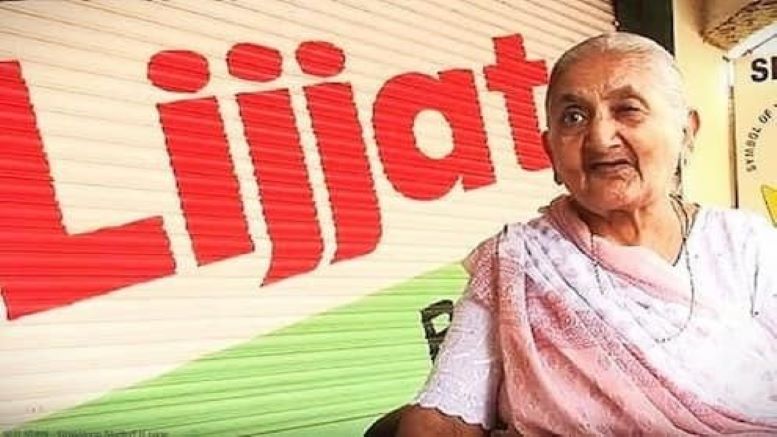This year’s Padma award ceremony, one of the highest civilian honours of India holds distinctiveness in the history of Padma awards. The awardees’ list deserves credit for being inclusive and recognising the efforts of men, women and transgenders from the last miles of the country. One of the awardees includes the co-founder of the famous Lijjat Papad.
Jaswantiben Jamnadas Popat gets Padma Shree
Jaswantiben Jamnadas Popat, one of the seven women who laid the foundation of world-famous Lijjat Papad has been awarded the Padma Shri award for making more than 45,000 women Aatmanirbhar in the true sense. Lijjat Papad, as an entity worths Rs 800 crore and is spread in 62 divisions all across the country.
Lijjat Papad, whose full name is Shri Mahila Griha Udyog Lijjat Papad, functions as a women’s worker cooperative and is involved in the manufacturing of various fast-moving consumer goods.
Fast-moving consumer goods are those goods that take less time to complete their cycle of manufacturing and selling.
Lijjat was started by borrowing Rs 80
It was started in 1959 by seven women namely Jaswantiben Jamnadas Popat, Parvatiben Ramdas Thodani, Ujamben Narandas Kundalia, Banuben. N. Tanna, Laguben Amritlal Gokani, Jayaben V. Vithalani, and Diwaliben Lukka. These women lived in Jabalpur. To kick start their venture, they borrowed Rs 80 from Chaganlal Parekh, a member of the Servants of India Society and a social worker. Chaganlal Parekh later went on to become their guide in the journey. With Rs 80, these 7 brave women took over a loss-making papad enterprise.
Slowly, these women started to make and sell papads from the roof-tops of their houses. Within a few months, the women were able to pay off Rs 80 borrowed from Chaganlal. After that, they decided to share profit and loss among the women involved. They vowed to take no monetary help from the outside and have maintained it to date.
The society saw compounded growth in 3 years
It was a matter of time before sales could pick up the pace. Within two years, the group was able to add 150 women under its fold. In the third year, the membership doubled to more than 300. As people started talking about the quality of Papads produced, it slowly became a quasi-brand in the areas where papads were being supplied.
Since only word of mouth publicity is not sufficient to expand the business, the women decided to name their product ‘Lijjat’ in 1962. The name was suggested by Dhirajben Ruparel for which he was awarded Rs 5. The organisation was named Shri Mahila Griha Udyog Lijjat Papad.
Product expansion and exports
As sales gained traction and organisation kept getting bigger, Lijjat registered itself as a society under the Societies Registration Act 1860 in 1966.
The same year Lijjat failed to establish a branch in Sangli Maharashtra. Within two months of registration, KVIC formally recognised Lijjat as a unit belonging to the “processing of cereals and pulses industry group” under the Khadi and Village Industries Act. It was also recognised as a “village industry”. This resulted in tax exemption and total capital of Rs 8,00,000 lakhs profit for the organisation. Within the next 15 years, Lizzat started producing other products like khakhra, masala, Vadi, wheat atta, and bakery products.
Society now made enough profit to advertise its brand in various vernacular newspapers and other news channels even in the international market. The late 1980s and 1990s saw Lijjat started gaining traction from foreign tourists and officials as well. Suddenly, Lijjat was a big hit on the international stage and started exporting its products to various countries through merchants. Currently, it exports to more than 25 countries which include countries like the United States, United Kingdom, France, Germany, Italy, Middle Eastern countries, Thailand, Singapore, Hongkong (China), Netherlands, Japan, Canada, Australia, South Africa.
Troubles and roadblocks could not stop them
The journey was never free of unforeseen troubles.
- During the first year, production was halted during the rainy season. The brave women found a new innovative technique to dry their papads. They started to use stoves to dry it and package it for selling.
- In July 1979, the general secretary of a trade union tried to interfere in Lijjat’s affairs, making certain demands on behalf of a few member-sisters. L. C. Joshi, Labour Advocate of Bombay, was called for consultations. In his observations on “Who owns Lijjat?”, he clarified that member-sisters were competent to decide for their own and it was not open for an outside agency to interfere with the internal working of Lijjat.
- Similarly in 2001, three persons were arrested for selling fake lijjat papads in Bihar. This forced the group to issue an explainer on their website for differentiating between fake and real papad.
Despite these roadblocks, the women’s cooperative kept on beating every odd hurdle en route.
Jaswantiben Jamnadas Popat played probably the biggest role in uplifting 3-4 generations of women and making them aatmanirbhar. With simple cooking skills, she made people of the country aware that someone’s innate talents are good enough to make them stand on their own. Lakhs of women have come out of the extreme poverty zone dye to lijjat papad and the Modi government has duly recognised the effort in recognising the genius idea behind the Lijjat Papad.
